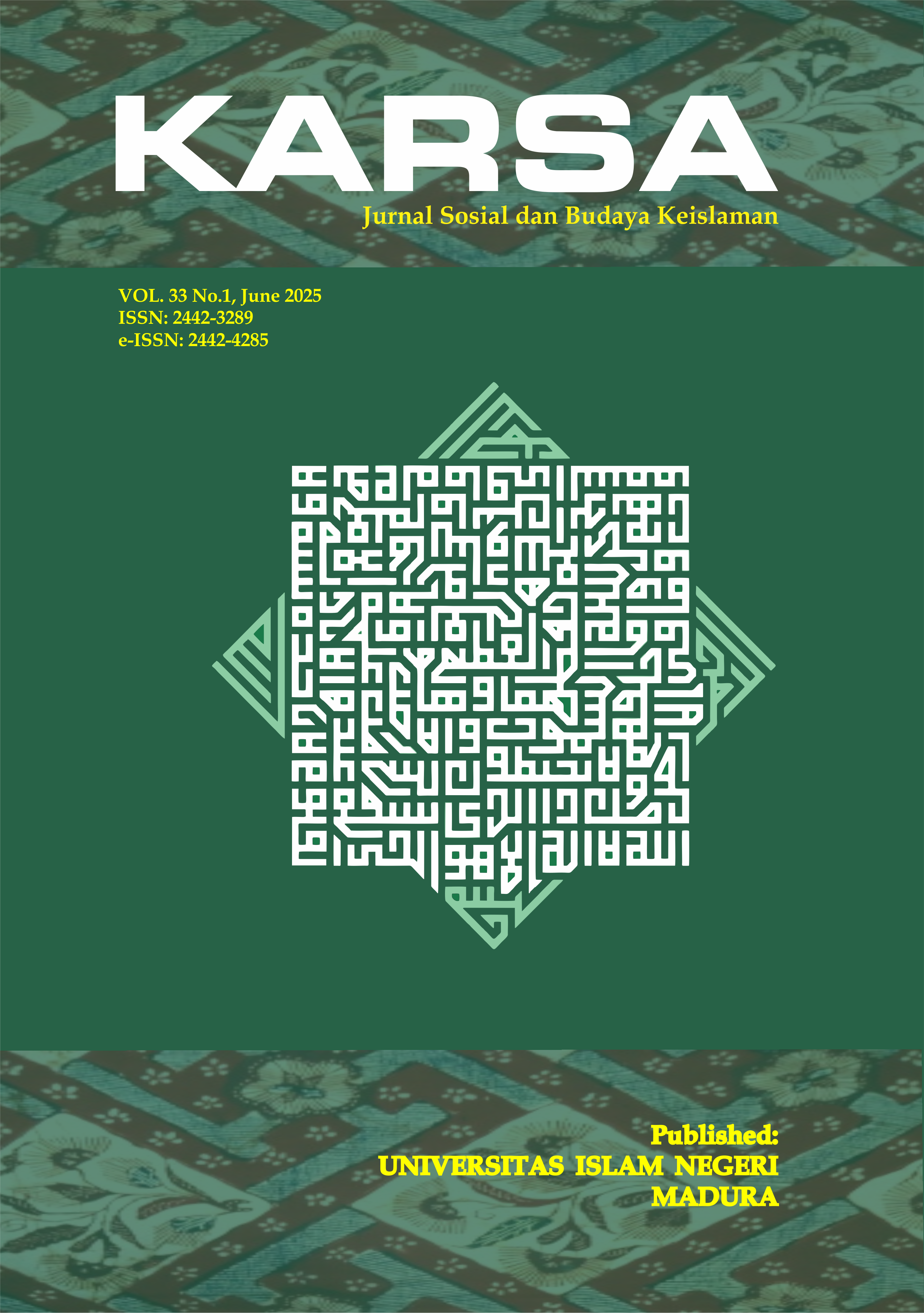Memorizing the Qur’an for Busy People: A Study of the Contribution of T.E.S. (Tilâwah Evaluasi Sederhana) Method in Enhancing Memorization of the Qur’an
 Abstract views: 547
,
Abstract views: 547
,
 PDF downloads: 323
PDF downloads: 323
Abstract
Facts show memorizing the Qur’an is difficult, especially considering contemporary man’s busyness. The memorizers of the Qur’an admit that they have difficulty finding time to repeat (murâja’ah) the memorizations they have consistently. This study tries to reveal the contribution of the T.E.S. method, a method of memorizing the Qur’an discovered by Ustadz Jemmi Gumilar ST., in improving the memorization of the Qur’an. Using a qualitative approach and descriptive method, this study shows that the T.E.S. method has positively contributed to improving the quality and quantity of memorization of the Qur’an of the tahfîzh participants. Many beneficiaries and recognition of the training participants for the effectiveness of the T.E.S. method prove this. Theoretically, the success of the T.E.S. method lies in time management and discipline or consistency in reading the Qur’an, memorizing, and repeating memorization.
Downloads
References
Abdurrahman, Jawad Musyaffa, and Adi Haironi. “Efektivitas Metode Muroja’ah Dalam Menghafal Al-Qur’an Mahasiswa Sekolah Tinggi Ilmu Tarbiyah Madani Yogyakarta.” Mutiara: Jurnal Penelitian Dan Karya Ilmiah 2, no. 4 (2024): 43–51.
Al-Bayati, Muntadher Shukur Khudhur. “Memorizing the Holy Quran through Cognitive Psychology Strategies.” Meras Journal 4, no. 7 (2024).
Andrias, Andrias Nurkamil Albusthomi. “Tinjauan Penyelenggaraan Tahfidz Al-Qur’an Di Sekolah.” Textura 6, no. 1 (2019): 50–60.
Anwar, Khoirul, and Mufti Hafiyana. “Implementasi Metode ODOA (One Day One Ayat) Dalam Meningkatkan Kemampuan Menghafal Al-Quran.” Jurnal Pendidikan Islam Indonesia 2, no. 2 (2018): 181–98.
Arini, Junita, and Winda Wahyu Widawarsih. “Strategi Dan Metode Menghafal Al-Qur’an Di Pondok Tahfidz Darul Itqon Lombok Timur.” Jurnal Penelitian Keislaman 17, no. 2 (2022): 170–90. https://doi.org/10.20414/jpk.v17i2.4578.
Atmi, Nur, and Muhammad Hasibuddin. “Efektivitas Metode Muraja’ah Dalam Meningkatkan Kualitas Hafalan Al-Qur’an Peserta Didik Kelas Takhassus Di SMP Islam Terpadu Nurul Fikri Makassar.” Education and Learning Journal 4, no. 2 (2023): 128–33.
Ayyad, Essam. “Re-Evaluating Early Memorization of the Qurʾān in Medieval Muslim Cultures.” Religions 13, no. 2 (February 1, 2022). https://doi.org/10.3390/rel13020179.
Aziz, Mu’azah Md, Wan Mahani Abdullah, Ainul Maulid Ahmad, Mohd Aswad Amat Mushim, and Muhammad Shahrizan Shahrudin. “Comparison between Conventional Method and Modern Technology in Al-Qur’an Memorization.” International Journal of Recent Technology and Engineering 8, no. 1 (2019): 289–94.
Basir, Abd, Tamjidnor, Suraijiah, Subianto Karoso, and Sui’d Saidi. “Enhancing Qur’an Reading Proficiency in Madrasahs Through Teaching Strategies Top of Form.” Nazhruna: Jurnal Pendidikan Islam 7, no. 2 (May 2, 2024): 373–89. https://doi.org/10.31538/nzh.v7i2.4985.
Bloom, Benjamin S. Learning for Mastery. Instruction and Curriculum. Regional Education Laboratory for the Carolinas and Virginia, Topical Papers and Reprints, Number 1. Evaluation Comment. Vol. 1. ERIC, 1968.
Brown, Jonathan A C. Hadith: Muhammad’s Legacy in the Medieval and Modern World. Simon and Schuster, 2017.
Castejon, J L, M D Prieto, A M Perez, and R Gilar. “The Role of Knowledge and of General Intellectual Skills in the Acquisition of Complex Learning.” PSICOTHEMA 16, no. 4 (2004): 600–605.
Chasanah, Nur. “Penggunaan Metode Tilawah Evaluasi Sederhana Dalam Meningkatkan Pelaksanaan Program Tahfidz Al-Qur’an Di Pondok Tahfidz Kalibening.” Institut Agama Islam Negeri Curup, 2023.
Chevallard, Yves, and Marianna Bosch. “Didactic Transposition in Mathematics Education.” In Encyclopedia of Mathematics Education, 170–74. Dordrecht: Springer Netherlands, 2014. https://doi.org/10.1007/978-94-007-4978-8_48.
Ebbinghaus, Hermann. Memory: A Contribution to Experimental Psychology, Translated by Henry A. Ruger & Clara E. Bussenius. New York: Teachers College, Columbia University, 1913.
Fatimah, Meti. “Metode Tahfizh Al-Qur’an Di Pondok Pesantren Muhammadiyah Boarding School Klaten.” Mamba’ul’Ulum, 2020, 112–27.
Fauziah, Hapsah, and Risma Amelia. “Pengaruh Penerapan Metode Muraja’ah Pada Pembelajaran Tahfidz Al-Qur’an Terhadap Keberhasilan Menghafal Al-Qur’an (Juz 30) Siswa Kelas Vi Di Mi Rohmaniyah Sukawening Garut.” Masagi 1, no. 1 (2022): 211–19.
Fauziyah, Siti Shobah. “Efektivitas Metode Muraja’ah Dalam Peningkatan Hafalan Al-Qur’an Santri Di Komplek Hindun Pondok Pesantren Ali Maksum Krapyak Yogyakarta,” 2018.
Flavell, John H. “Metacognition and Cognitive Monitoring: A New Area of Cognitive–Developmental Inquiry.” American Psychologist 34, no. 10 (1979): 906.
Gumilar, Jemmi. Ketika Tilawah Dan Tahfidz Menyatu. Bandung: Bang Jemm Publishing House, 2017.
———. Quantum Tilawah Metode Tes. Bandung: Bang Jemm Publishing House, 2014.
Hafidhoh, Husnul, Mubarok Fatahillah, and Manapiyah Maoti. “The Effectiveness of the Movement Method in Enhancing Qur’an Memorization and Comprehension in Preschool Children: A Case Study at TK (Preschool) Al-Fatihah School.” Global Educational Research Review 1, no. 3 (2024): 123–34.
Hidayah, Dian. “Efektivitas Metode Muraja’ah Dalam Meningkatkan Hafalan al-Qur’an Santri Di Pondok Pesantren KH. Syamsuddin Durisawo Ponorogo Tahun 2023.” IAIN Ponorogo, 2023.
Hidayat, Laksmana Safaq, and Dzulfikar Akbar Romadlon. “Improving the Quality of Student Memorizing Using the Wafa Method in Elementary Schools.” Indonesian Journal of Innovation Studies 20 (2022): 10–21070.
Jamora, Abdul Gani, Adinda Rahmah Rangkuti, Manna Wassalwa, Alfiah Khairani, and Harits Heriadi. “Penanganan Santri Lupa Hafalan Al-Qur’an Di Pondok Pesantren Darul Huffazh Al Arief Kecamatan Percut Sei Tuan.” Jurnal Pendidikan Dan Konseling (JPDK) 5, no. 4 (2023): 104–8.
John Hattie, and Helen Timperley. “The Power of Feedback.” Review of Educational Research 77, no. 1 (2007): 81–112.
Khamid, Abdul, Rofiqotul Munifah, and Aida Dwi Rahmawati. “Efektifitas Metode Muraja’ah Dalam Menghafal Al-Qur’an Pada Santri Pondok Pesantren.” Al-TA’DIB: Jurnal Kajian Ilmu Kependidikan 14, no. 1 (2021): 31. https://doi.org/10.31332/atdbwv14i1.1432.
Khoiruddin, H, and A W Kustiani. “Manajemen Pembelajaran Tahsin Al-Quran Berbasis Metode Tilawati.” Jurnal Isema: Islamic Educational …, 2020.
Khon, Abdul Majid. Hadits Tarbawi Hadis-Hadis Pendidikan. Jakarta: Kharisma Putra Utama, 2012.
Lexy J. Moleong. Metodologi Penelitian Kualitatif. Bandung: PT. Remaja Rosdakarya, 2007.
Madinah, Aishah, and Zakaria Stapa. “The Integration of Naqli and Aqli Knowledge in Tahfiz Education: A Conceptual Framework.” Journal of Islamic Education Studies 2, no. 1 (2020): 35–44.
Maelani, Neneng. “Strategi Peningkatan Minat Menghafal Al-Qur’an Di SMPIT Al-Multazam Kuningan.” Guau: Jurnal Pendidikan Profesi Guru Agama Islam 2, no. 1 (2022): 439–50.
Mahbengi, Maqfirah, and Retno Triwoelandari. “Strategi Guru Tahfidz Dalam Meningkatkan Hafalan Al-Qur’an Santri Rumah Qur’an Umar Bin Khatab Bogor.” Reslaj: Religion Education Social Laa Roiba Journal 6, no. 3 (2024): 799–808.
Mangen, Anne, and Jean-Luc Velay. “Digitizing Literacy: Reflections on the Haptics of Writing.” Advances in Haptics 1, no. 3 (2010): 86–401.
Manurung, Purbatua, Abdul Hasan Saragih, and Pagar Hasibuan. “A Study of the Philosophy of Education and Analysis of the Principles of Implementing Education According to the Al-Qur’an.” Pharos Journal of Theology 105, no. 2 (2024): 1–13. https://doi.org/10.46222/pharosjot.105.28.
Marza, Suci Eryzka. “Regulasi Diri Remaja Penghafal Al-Qur’an Di Pondok Pesantren al-Qur’an Jami’atul Qurro’Sumatera Selatan.” Jurnal Intelektualita: Keislaman, Sosial Dan Sains 6, no. 1 (2017): 145–60.
Miles, B., A. Matthew, Michael Huberman, and Johnny Saldana. Qualitative Data Analysis : A Methods Sourcebook. 3rd ed. New York: SAGE Publications, 2014.
Mundiri, Akmal, and Irma Zahra. “Implementasi Metode STIFIn Dalam Meningkatkan Kemampuan Menghafal Al-Qur’an Di Rumah Qur’an STIFIn Paiton Probolinggo.” Jurnal Pendidikan Agama Islam (Journal of Islamic Education Studies) 5, no. 2 (2017): 201–23.
Nawabudin, Abdurrab. Teknik Menghafal Al-Qur’an. Bandung: Sinar Baru, 1991.
Petta Solong, Najamuddin, and Ihyauddin Jazimi. “Efektivitas Metode Muraja`ah Dalam Kegiatan Tahfîdz Al-Qur`an Di Pondok Pesantren Al-Muttaqiin Taki Niode Kota Gorontalo.” Irfani 16, no. 1 (2020): 96–114. https://doi.org/10.30603/ir.v16i1.1783.
Poniman, Farid. “A Grand Theory of STIFIn Personality: Basic Functions Theory Revisited.” International Journal of Psychosocial Rehabilitation 24, no. 5 (2020): 710–15. https://doi.org/10.37200/ijpr/v24i5/pr201737.
Putri, Devi Nurdiana, and Dzulfikar Akbar Romadlon. “Application of Talaqqi Method in Learning Tahfîdz Al-Qur’an in Early Children.” Indonesian Journal of Education Methods Development 18, no. 1 (October 13, 2022). https://doi.org/10.21070/ijemd.v21i.706.
Rahmi, Yuliani. “Metode Muraja’ah Dalam Menghafal Al-QurAn Di Pondok Pesantren Al-Mubarok Tahtul Yaman Kota Jambi.” INNOVATIO: Journal for Religious Innovations Studies 19, no. 1 (2019): 65–76.
Richard E. Mayer. Multimedia Learning. Vol. 77. Cambridge: Cambridge University Press, 2005.
Rizkiyah, N, C Sa’diyah, and A Sudrajat. “Penerapan Metode Tilawati Dalam Meningkatkan Kemampuan Membaca Al-Qur’an Taman Pendidikan Al-Qur’an Di Desa Jeruk.” Vicratina: Jurnal Pendidikan Islam, 2020.
Rizqi, Novita, Abd Basir, Siti Shalihah, Hafiz Mubarak, and Akhmad Syahbudin. “Efektivitas Metode Muraja’ah Hafalan Alquran Siswa Pada SD Islam Terpadu Al Khair Barabai Kalimantan Selatan.” Al Qalam: Jurnal Ilmiah Keagamaan Dan Kemasyarakatan 17, no. 6 (2023): 4484–4501.
Sabki, Aishah, and Glenn Hardaker. “Memorisation and Learning in Sufi British Madrasahs.” Journal for Multicultural Education 13, no. 4 (November 18, 2019): 302–19. https://doi.org/10.1108/JME-06-2019-0048.
Safitri, Laila Nur, Akil Akil, and Acep Nurlaeli. “Penerapan Metode One Day One Ayat Dalam Meningkatkan Motivasi Menghafal Al-Qur’an Surat An-Naba’dan An-Nazi’at Pada Santri Kelas 4 Di Rumah Tahfidz Daarul Hijrah.” Al-Madrasah: Jurnal Ilmiah Pendidikan Madrasah Ibtidaiyah 7, no. 4 (2023): 1898–1910.
Sweller, John. “Cognitive Load Theory, Learning Difficulty, and Instructional Design.” Learning and Instruction 4, no. 4 (1994): 295–312.
Syafrudin, Muh. Azhar. “Penerapan Metode Kauny Dalam Menghafal Al-Qur’an.” UMS, 2017.
Taopik, Epik. “Efektivitas Metode TES (Tahfidz Evaluasi Sederhana) Terhadap Kualitas Membaca Dan Jumlah Hafalan Dalam Pembelajaran Tahfidz Al-Qur’an (Quasi Eksperimen Di SMP Bina Insan Boarding School Ciawi Kab. Bogor).” Online Thesis. IAID Ciamis, 2021.
Tarigan, Wulan Agustina B R. “Efektivitas Penggunan Metode Tes (Tilawah Evaluasi Sederhana) Pada Program Tahfizhul Qur’an Siswa Di MTs Hasanah Pekanbaru.” UIN Syarif Kasim Riau, 2021.
Tarmuji, Nor Habibah, Noraini Mohamed, Siti Fahazarina Hazudin, and Wan Azmi Wan Ahmad. “Linking Study of Memorising Quran with Academic Performance.” Asia Pacific Journal of Educators and Education 37, no. 1 (July 29, 2022): 181–91. https://doi.org/10.21315/apjee2022.37.1.9.
Thaha, Hisban, Edhy Rustan, and Subhan Subhan. “Learning Model Development of Memorizing the Qur’an Through Integration of Internal and External Representation.” Journal of Education, Teaching and Learning 6, no. 1 (2021): 95–101.
Wahid, Wiwi Alawiyah. Cara Cepat Bisa Menghafal Al-Qur’an. Yogyakarta: Banguntapan, 2014.
Wang, Tengfei, Xuezhu Ren, and Karl Schweizer. “Learning and Retrieval Processes Predict Fluid Intelligence over and above Working Memory.” Intelligence 61 (2017): 29–36.
Yusuf, Kadar M. Tafsir Tarbawi: Pesan-Pesan al-Qur’an Tentang Pendidikan. 2nd ed. Jakarta: Azmah, 2015.
Zamani, Zaki, and Muhammad Syukron Maksum. Menghafal Al-Qur’an Itu Gampang. Yogyakarta: Mutiara Media, 2009.
Zimmerman, Barry J. “Becoming a Self-Regulated Learner: An Overview.” Theory into Practice 41, no. 2 (2002): 64–70.
The journal operates an Open Access policy under a Creative Commons Non-Commercial Share-Alike license. Authors who publish with this journal agree to the following terms:
- Authors retain copyright and grant the journal right of first publication with the work simultaneously licensed under a Creative Commons Attribution License that allows others to share the work with an acknowledgement of the work's authorship and initial publication in this journal.
- Authors are able to enter into separate, additional contractual arrangements for the non-exclusive distribution of the journal's published version of the work (e.g., post it to an institutional repository or publish it in a book), with an acknowledgement of its initial publication in this journal.
- Authors are permitted and encouraged to post their work online (e.g., in institutional repositories or on their website) prior to and during the submission process, as it can lead to productive exchanges, as well as earlier and greater citation of published work.














